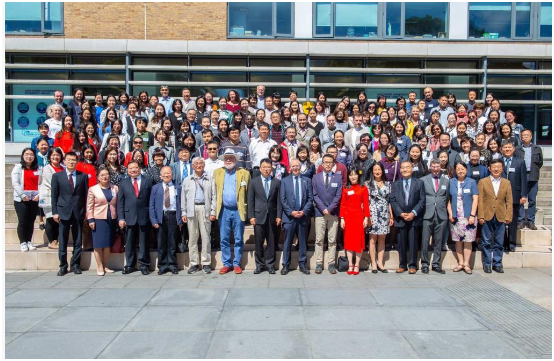The 17th International Conference on Teaching and Learning Chinese in Higher Education (The 2019 Annual Conference of the British Chinese Language Teaching Society) was held in Lancaster University, UK, from July 5 to 7, 2019. Professor Li Yuming, Director of ACLR, led a delegation of 8 members and delivered a keynote speechat the Conference. About 180 scholars and researchers in the Chinese language teaching and learning attended the Conference. They came from nearly 30 different countries and regions of Europe, America and Asia, including China Hong Kong and China Taiwan.

Professor Li Yuming presented a keynote-speech, Research on the Status of Chinese as a Foreign Language and Related Issues, at the conference. He first introduced the six foreign language status, namely diplomatic languages, foreign languages for special fields, foreign languages for adults education, foreign languages in basic education system, first foreign language and quasi-first language or first language as well as the foreign language stepped distribution and factors affecting the rise and fall of status. He also noted that the Chinese language had already surpassed the status as diplomatic languages, foreign languages for special fields, foreign languages for adults educationand became a foreign language in basic education system. Today, there are over 70 countries in the world listing Chinese language into their basic education system. There have emerged new phenomena and thoughts worthy of notice, bringing new requirements tothe scholars at home and abroad. First, we should pay special attention to the phenomenon that Chinese language learners are becoming younger and younger. This requires the researchers and scholarsto discuss the impacts on students, teachers, courses, teaching methods, tests and further education; Second, Chinese language is still in its infancy as a foreign language for basic education, and we should promote Chinese to be the major foreign language in basic education; Third, Chinese is the second foreign language now in tourism and shopping, and we need to discuss the possibility and feasibility of Chinese language becoming the second foreign language in the world. To achieve this goal, international Chinese language education should make its contribution.
Professor Li Yuming’s report received strong resonance from the participants. In Britain, people used to study Chinese in universities; now students in middle and primary school have begun to learn Chinese, which means that Chinese has entered the national education system of Britain. In addition to students, more and more people in Britain start to learn Chinese now, whether for business and tourism, or for purely personal interests. People learning Chinese in Britain are gradually becoming more diverse, as are their learning needs and goals. We need new theories, methods and strategies to tackle new challenges arising from that Chinese language plays a more prominent role in the world as a foreign language.

In the Session ofAcademic Training, Professor Yang Erhong introduced the latest research achievements of her team working on the Automatic Generation of Definitions of Learning Dictionary.The report introduced deep learning to generate the definition of Chinese words automatically. This requires computers to generate the definition of the given Chinese words automatically to assist the compilation of Chinese dictionaries for learners. According to the requirements, a database of generations fordefinitions of Chinese words was built, and every data is a triad composed of the interpreted word, sememe, and interpretation. Sememe, the minimum unit of a definition, comes from HowNet. It can provide the definition of the given word according to the Chinese Concept Dictionary (CCD). The report put forward two new models for generating definitions of Chinese words: the Adaptive Attention Model and the Adaptive Self-Attention Model. Experiments show that the Adaptive Self-Attention Model is the best model now for interpretation of Chinese words, and it can make full use of sememe information, substantially improving the performance of the model.

Professor Zhang Baolin, Honorary Researcher of ACLR as well as Manager of the Chinese Interlanguage Corpus Construction Project, presented a report entitled Design and Construction of Corpus and Application Integrated Platform.Professor Fu Shangxing, Honorary Researcher of ACLR as well as the Manager of Sino-Russia Economic and Trade Cooperation Information Database and Russian-Chinese Intelligent Service Platform presented a report at the conference. In addition, Professor Liu Xun, Professor Jiang Xin and Associate Professor Zhang Junping, all from Beijing Language and Culture University, made their reports respectively at the conference.

The 17thInternational Conference on Teaching and Learning Chinese in Higher Education was hosted by the British Chinese Language Teaching Society and organized by the Confucius Institute at Lancaster University, UK. The theme of the Conference is “New Theories, New Approaches and Methodologies, New Issues and New Strategies in the Pedagogy of Teaching Chinese as an International Language”. The three-day Conference was divided into two parts, the keynotespeeches in the main venue and sessions in seven other venues. Discussed topics included Chinese ontology, second language acquisition, Chinese teaching methods and curriculum design.